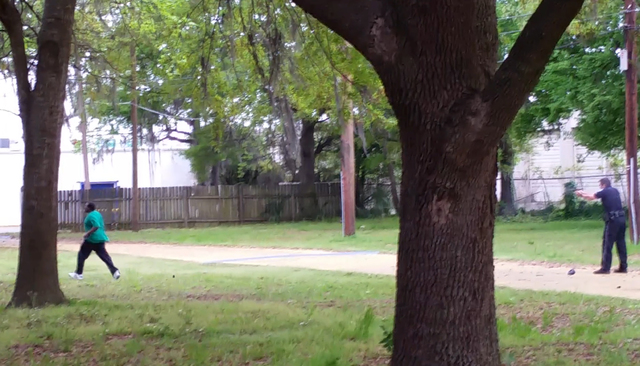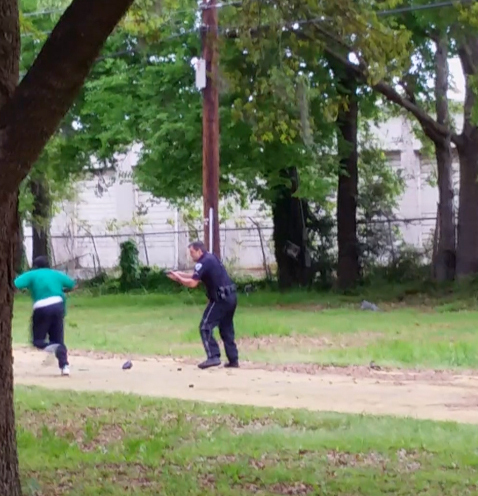NORTH CHARLESTON, S.C. — A white South Carolina police officer who claimed he killed a black man in self-defense was quickly charged with murder after a bystander’s video recorded him firing eight shots at the man’s back as he ran away. Government authorities sought Wednesday to contain the outrage as protests began.
NORTH CHARLESTON, S.C. — A white South Carolina police officer who claimed he killed a black man in self-defense was quickly charged with murder after a bystander’s video recorded him firing eight shots at the man’s back as he ran away. Government authorities sought Wednesday to contain the outrage as protests began.
About 40 to 50 people gathered Wednesday outside City Hall in North Charleston, led by a group formed after the fatal shooting of another black man in Ferguson, Missouri.
The video, provided to the dead man’s family and lawyer by an unidentified person who shot the footage, shows North Charleston Patrolman Michael Thomas Slager dropping his stun gun, pulling out his handgun and firing at Walter Lamer Scott from a distance as he runs away. The 50-year-old man falls after the eighth shot, fired after a brief pause.
Scott’s parents appeared separately on TV shows Wednesday morning, a day after the officer was charged.
Walter Scott Sr. said that in the video, the officer “looked like he was trying to kill a deer running through the woods” as he shoots his son. He told NBC’s “Today Show” that his son may have run because he owed child support and didn’t want to go back to jail.
Judy Scott, the slain man’s mother, called the video “the most horrible thing I’ve ever seen.”
“I almost couldn’t look at it to see my son running defenselessly, being shot. It just tore my heart to pieces,” she said on ABC’s “Good Morning America.”
The bystander who recorded the scene provided the video to Scott’s family and lawyers, who made it available to the media on Tuesday. The man remains unidentified, but is assisting investigators.
North Charleston Mayor Keith Summey announced the murder charge at a news conference Tuesday, saying Slager had made “a bad decision.”
“When you’re wrong, you’re wrong,” Summey said. “When you make a bad decision, don’t care if you’re behind the shield or a citizen on the street, you have to live with that decision.”
Police initially released a statement that promised a full investigation but relied largely on the officer’s description of the confrontation, which began with a traffic stop Saturday as Slager pulled Scott over for a faulty brake light.
On Monday, Slager’s then-attorney David Aylor released another statement saying the officer felt threatened and fired because Scott was trying to grab Slager’s stun gun.
Aylor dropped Slager as a client after the video surfaced, and the officer, a five-year veteran with the North Charleston police, appeared without a lawyer at his first appearance Tuesday. He was denied bond and could face 30 years to life in prison if convicted of murder.
The shooting comes amid a plunge in trust between law enforcement and minority communities after the officer-involved killings of Michael Brown in Ferguson, Missouri, and Eric Garner on Staten Island, New York. Nationwide protests intensified after grand juries declined to indict the officers in both cases.
“We have to take a stand on stuff like this,” said Lance Braye, 23, who helped organize Wednesday’s demonstration in North Charleson, led by a local “Black Lives Matter” group. “We can’t just shake our heads at our computer screens.”
Scott’s family and their attorney, L. Chris Stewart, appealed to keep the protests peaceful, saying the swift murder charge shows that the justice system is working so far in this case.
But Stewart said the video alone forced authorities to act decisively.
“What if there was no video? What if there was no witness, or hero as I call him, to come forward?” asked Stewart, adding that the family plans to sue the police.
The video shows an interaction between Scott and the officer, with the officer reaching at the man and the two seeming to touch near the hands before Scott tried to flee.
The video shows Scott falling face-down from about 30 feet away after being shot in the back. The officer then slowly walks toward him and orders Scott to put his hands behind his back, but the man doesn’t move. Slager then pulls Scott’s arms back and cuffs his hands. Then he walks briskly back to where he fired the shots, picks up an object, and returns to Scott’s prone body, dropping the object by Scott’s feet, the video shows.
Scott had four children, was engaged and had been honorably discharged from the U.S. Coast Guard. There were no violent offenses on his record, Stewart said. He also speculated that Scott may have tried to run because he owed child support, which can lead to jail time in South Carolina until it is paid.
The FBI and the Justice Department’s Civil Rights Division are investigating as well. Proving that an officer willfully deprived an individual of his or her civil rights has historically been a tall burden for federal prosecutors, particularly when an officer uses force during a rapidly unfolding physical confrontation in which split-second decisions are made.
The Justice Department spent months investigating the Ferguson shooting before declining to prosecute Officer Darren Wilson in that case. But it’s easier to make cases against officers who use force as an act of retribution or who can make no reasonable claim that their life was in jeopardy when they took action.
North Charleston is South Carolina’s third-largest city. For years, it battled an economic slump caused by the mid-1990s closing of the Charleston Naval Base on the city’s waterfront. The city has bounced back since, largely because of a huge investment by Boeing, which has a 787 aircraft manufacturing plant in the city and employs about 7,500 people in South Carolina, most in North Charleston.
The city’s population was about 47 percent black in 2010, according to census figures from 2010 — the most recent data that breaks out population by race.
—————
Smith reported from Charleston, South Carolina. Contributors include Tom Foreman Jr. in Charlotte, North Carolina and Eric Tucker in Washington.


